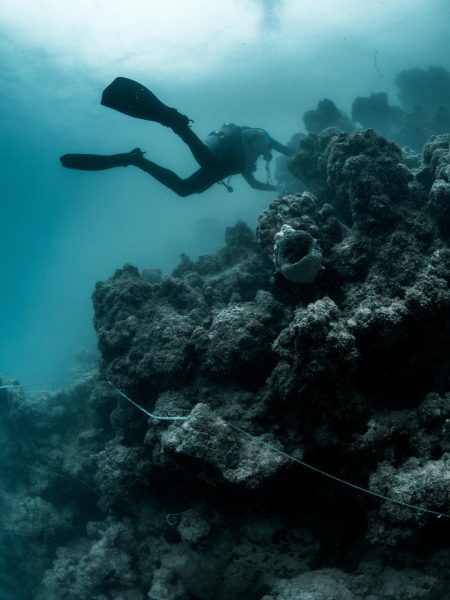
Hawaii, Saudi Arabia, Australia, Palau: Thomas DeCarlo has dived into the oceans of all these places and beyond to follow his passion for coral reefs.
His journey in science started as an undergraduate student at the University of San Diego, when he “naively” chose to major in marine science, a topic he knew little about. “Early on in undergrad I got to do a cool research trip with my undergrad professor in the US Virgin Islands studying corals. And pretty much, it was corals from then on,” DeCarlo said.
After undergrad, DeCarlo went into a combined Ph.D. program between Massachusetts Institute of Technology and Woods Hole Oceanographic Institution in Cape Cod, Massachusetts. It was there that DeCarlo got to do field work on coral reefs in the Caribbean Sea and the South China Sea, which was his main research site. He even got the opportunity to explore the “pristine” reef sites in Palau, a small-island nation in the western Pacific, which are only accessible to scientists for research purposes. He completed two post doctorates before working as an assistant professor at Hawaii Pacific University. DeCarlo joined Tulane University this summer as an assistant professor and leader of the sclerochronology lab at Tulane, known more familiarly as the “Coral Lab.”
DeCarlo was an author of a paper recently published in Nature, a prestigious, peer-reviewed science journal. The paper, published in August, looks at how ocean heat extremes in the past two decades are causing coral reef bleaching in the Great Barrier Reef of Australia and endangering the exceptional biodiversity there. Bleaching is when coral expel the algae living symbiotically within their cells. These algae provide most of the coral’s energy. Although bleaching may not kill coral, it leaves the coral vulnerable and “subject to mortality,” according to the National Oceanic and Atmospheric Administration.
The paper is entitled “Highest ocean heat in four centuries places Great Barrier Reef in danger.” According to DeCarlo, the research team intentionally put “in danger” in the title.
“It’s definitely in danger. It’s suffering. It’s going downhill,” he said.
The research used coral cores from the Great Barrier Reef to reconstruct past ocean temperatures, confirming that the past two decades’ high temperatures are unprecedented. A coral core contains density bands similar to a tree’s rings. The alternating density bands inside the coral skeleton to understand water temperatures and reef health dating back decades or centuries.
DeCarlo aims to create a “coral bleaching forecast system” that incorporates the nuances of coral reefs better than the current bleaching forecast system of the NOAA. The proposed system would predict when coral reefs will experience bleaching using temperature trackers on the coral themselves. Using temperature trackers directly on the coral provides a more accurate temperature predictor than the current system, which uses ocean temperatures of several kilometer areas and is accurate only about half the time.
Coral reefs are important because they are ecologically and economically vital. Not only are they extremely biodiverse, but they are also vital to the economies of nearby countries. Reefs are “protecting shorelines from wave exposure…All the infrastructure that [has been] built would just erode away if the reef wasn’t out there,” DeCarlo said.
Coral reefs also provide a study system for environmental changes because of their extreme sensitivity. DeCarlo compares coral reefs to a “canary in a coal mine” because of their marked responses to minor changes. Variations as little as 1-degree Celsius can “change a coral’s physiology from being healthy to bleached and dying,” DeCarlo said. The Great Barrier Reef is a particularly unique site because of its vast expanse spanning nearly 350,000 square kilometers and its status as a World Heritage Area.
One of the greatest challenges facing coral reefs right now, other than warming oceans, is a lack of acknowledgment between scientists, governments and other organizations on whether or not they are threatened.
“We can’t even agree that the Great Barrier Reef is in danger…we’re several steps behind where discussion needs to be,” DeCarlo said.
DeCarlo’s work shines a critical light on the threats facing coral reefs and emphasizes the pressing need for conservation efforts, accurate forecasting and acknowledgement of these issues. His work at Tulane and beyond is championing coral reefs’ survival for future generations.
More information about the sclerochronolgy lab and opportunities for students to get involved can be found here.


